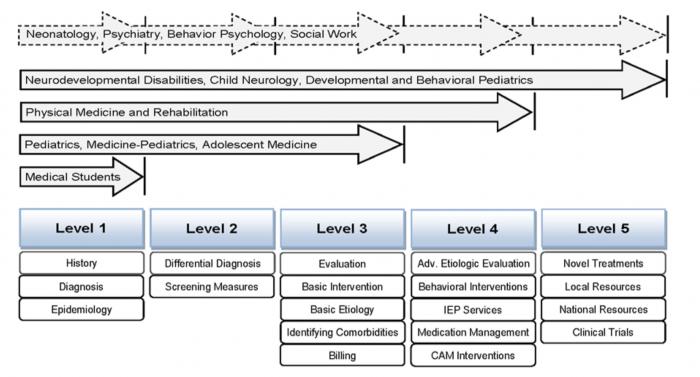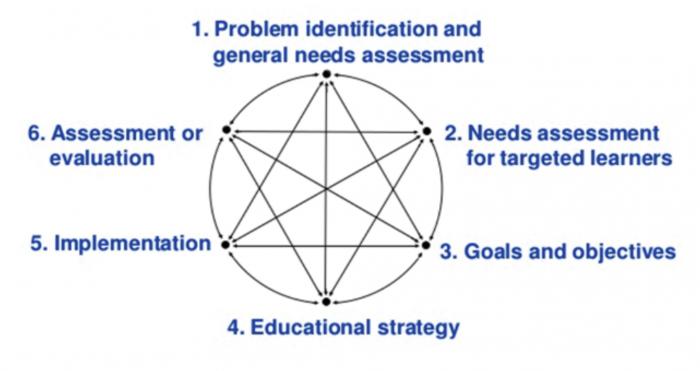The Kennedy Krieger Curriculum: A Multi-Level Curriculum on Neurodevelopmental and Behavioral Disorders of Childhood for Medical and Allied Health Professionals
Authors: Mary Leppert, MB, BCH; Joyce Harrison, MD; and Anna Maria Wilms Floet, MD
Background
The United States is facing a crisis in treating childhood developmental, behavioral and mental health disorders. This crisis is the consequence of a quickly rising prevalence of these disorders, a shortage of pediatric subspecialists, and an underprepared general pediatric workforce.
Kennedy Krieger Institute, the first University Affiliated Program in the United States established for the evaluation, management, research and advocacy of pediatric neurodevelopmental disorders, is well-positioned to lead the way in healthcare training innovation in developmental disabilities. The Institute provides high-caliber professional training and state-of-the-art interdisciplinary care for children and young adults with developmental disabilities, behavioral disorders, and disorders of the brain, spinal cord and musculoskeletal system.
Kennedy Krieger’s unique patient population and expert faculty make it a formidable educational venue for approximately 1,000 trainees of various disciplines each year. The volume and diversity of trainees at the Institute present a clear need and compelling opportunity to improve the efficiency and effectiveness of teaching. The Kennedy Krieger Curriculum, a faculty-led, interdisciplinary, innovative educational collaboration, was designed in response to that need and opportunity.
Curriculum Design
The Kennedy Krieger Curriculum is a comprehensive, milestone-based, semi-structured curriculum, developed by Kennedy Krieger teaching faculty members and appropriate for learners of all disciplines and educational levels. Each of its five learning levels is separated into individual modules, which can be completed online in 15–20 minutes. The flexibility and generalizability of the curriculum allow it to be implemented by faculty members and trainees in multiple applications, for independent learning or pre-learning prior to rotations, for blended learning in anticipation of clinical encounters, and for “just-in-time” learning as specific questions and concerns arise during or following clinical encounters. David E. Kern’s six-step approach to curriculum development (Thomas, P.A., et al., 2016) was utilized in the design of the curriculum.


Purpose
To evaluate the effectiveness of the curriculum across diverse learner groups, measured through pre-and post-exposure knowledge questions.
Method
Kennedy Krieger Trainees
-
Participants in the Kennedy Krieger Institute training program were asked to respond to pre- (prior to content delivery) questions embedded in each module and post- questions in the form of a cumulative exam
-
Neurodevelopmental disabilities residents and nurse practitioners
-
Data collection completed with polling program, Poll Everywhere
Kennedy Krieger ECHO Participants
-
Participants in the Kennedy Krieger Institute Network for Early Childhood (KKI-NECT) teleECHO, a longitudinal educational program based on the ECHO model, were asked to respond to pre- (prior to content delivery) and post (one week after content delivery) questions embedded in each module
-
Pediatric primary care clinicians, including physicians, physician assistants, nurse practitioners, social workers, and psychologists
-
Data collection completed with polling program, Poll Everywhere
Results
Kennedy Krieger Trainees
There was a significant gain in the percentage of questions answered correctly from pre (M = 50.68, SD = 10.64) to post (M = 71.60, SD = 7.98) t(16) = 8.92, p < .001.
Kennedy Krieger ECHO Participants
There was a significant gain in the percentage of questions answered correctly from pre (M = 49.84, SD = 31.90) to post (M = 75.88, SD = 25.60), t(180) = 10.50, p < .001.
|
Learner |
Pre-test averages (% correct) |
Post-test averages (% correct) |
p-value |
|
Kennedy Krieger trainees |
50.68 |
71.60 |
<.001 |
|
Kennedy Krieger ECHO participants |
49.94 |
75.88 |
<.001 |
Conclusion
The Kennedy Krieger Curriculum addresses health inequities by training the healthcare workforce of the future, thereby increasing access to care for children with developmental, behavioral and mental health disorders. In applications of the curriculum both within the Institute and externally with community health care professionals, we found significant positive shifts in knowledge measured by pre- and post- exposure knowledge questions. The development, implementation and evaluation of the Kennedy Krieger Curriculum will be ongoing endeavors to ensure that content remains up to date and evidence-based. It provides a high-quality, standardized, evidence-based educational opportunity that will bolster the knowledge of all learners, and improve the care of a growing and vulnerable population of children in the United States for generations to come.
Reference
Thomas, P.A., Kern, D.E., Hughes, M.T., & Chen, B.Y. (2016). Curriculum development for medical education: A six-step approach. Johns Hopkins University Press.
